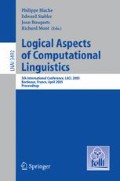Abstract
Kanazawa has shown that k-valued classical categorial grammars have the property of finite elasticity [1], which is a sufficient condition for learnability. He has also partially extended his result to general combinatory grammars, but left open the question of whether some subsets of general combinatory grammars have finite elasticity. We propose a new sufficient condition which implies learnability of some classes of k-valued general combinatory grammars, focusing on the way languages are expressed through a grammatical formalism rather than the classes of languages themselves.
Access this chapter
Tax calculation will be finalised at checkout
Purchases are for personal use only
Preview
Unable to display preview. Download preview PDF.
References
Kanazawa, M.: Learnable classes of categorial grammars. Cambridge University Press, Cambridge (1998)
Gold, E.: Language identification in the limit. Information and control 10, 447–474 (1967)
Buszkowski, W., Penn, G.: Categorial grammars determined from linguistic data by unification. Technical Report TR-89-05, Department of Computer Science, University of Chicago (1989)
Wright, K.: Identification of unions of languages drawn from an identifiable class. In: Proceedings of the Second Annual Workshop on Computational Learning Theory, pp. 328–333. Morgan Kaufmann, San Francisco (1989)
Motoki, T., Shinohara, T., Wright, K.: The correct definition of finite elasticity: corrigendum to Identification of unions. In: Proceedings of the Fourth Annual Workshop on Computational Learning Theory, San Mateo, CA, p. 375. Morgan Kaufmann, San Francisco (1991)
Costa Florêncio, C.: Combinatory categorial grammars and finite elasticity. In: Hoste, V., Pauw, G.D. (eds.) Proceedings of the Eleventh Belgian-Dutch Conference on Machine Learning, pp. 13–18. University of Antwerp (2001)
Steedman, M.: The Syntactic Process. The MIT Press, Cambridge (2000)
Shinohara, T.: Inductive inference of monotonic formal systems from positive data. New Generation Computing 8, 371–384 (1991)
Costa Florêncio, C.: Learning categorial grammars. PhD thesis, Utrecht University (2003)
Besombes, J., Marion, J.Y.: Learning reversible categorial grammars from structures. In: Proceedings of Categorial Grammars 2004, Montpellier, France, pp. 148–163 (2004)
Bar-Hillel, Y., Gaifman, C., Shamir, E.: On categorial and phrase structure grammars (1960)
Béchet, D., Dikovsky, A., Foret, A., Moreau, E.: On learning discontinuous dependencies from positive data. In: Proceedings of the 9th conference on Formal Grammar (2004)
Hockenmaier, J.: Data and models for statistical parsing with Combinatory Categorial Grammar. PhD thesis, School of Informatics, The University of Edinburgh (2003)
Sleator, D.D.K., Temperley, D.: Parsing english with a link grammar. Technical Report CMU-CS-TR-91-126, Carnegie Mellon University, Pittsburgh, PA (1991)
Temperley, D., Sleator, D., Lafferty, J.: Link grammar (1991), http://hyper.link.cs.cmu.edu/link/
Béchet, D.: k-valued link grammars are learnable from strings. In: Proceedings Formal Grammars 2003, pp. 9–18 (2003)
Moreau, E.: From link grammars to categorial grammars. In: Proceedings of Categorial Grammars 2004, Montpellier, France, pp. 31–45 (2004)
Author information
Authors and Affiliations
Editor information
Editors and Affiliations
Rights and permissions
Copyright information
© 2005 Springer-Verlag Berlin Heidelberg
About this paper
Cite this paper
Moreau, E. (2005). Learnable Classes of General Combinatory Grammars. In: Blache, P., Stabler, E., Busquets, J., Moot, R. (eds) Logical Aspects of Computational Linguistics. LACL 2005. Lecture Notes in Computer Science(), vol 3492. Springer, Berlin, Heidelberg. https://doi.org/10.1007/11422532_13
Download citation
DOI: https://doi.org/10.1007/11422532_13
Publisher Name: Springer, Berlin, Heidelberg
Print ISBN: 978-3-540-25783-7
Online ISBN: 978-3-540-31953-5
eBook Packages: Computer ScienceComputer Science (R0)

